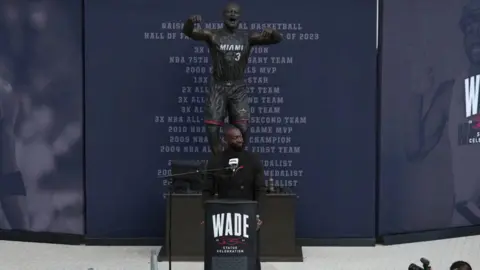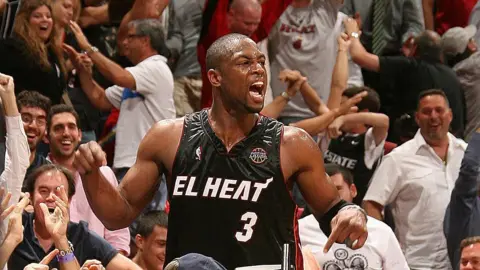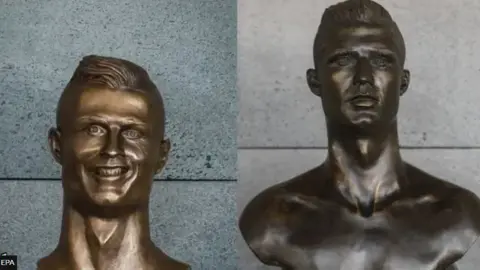Statue of NBA star Dwyane Wade sparks fan backlash
 Getty Images
Getty ImagesA newly unveiled statue of beloved US basketball star Dwyane Wade has sparked online backlash after some said they couldn't see a resemblance to the ex-Miami Heat icon.
The statue depicts Wade yelling "this is my house" after scoring a game-winning three-point shot against the Chicago Bulls in 2009. Wade called the statue "beautiful" when it was unveiled in Miami on Sunday.
But critics said the statue's face looks more like actors Laurence Fishburne or Kelsey Grammer. Fellow NBA Hall of Famer Paul Pierce was among the haters, saying Wade needed a "redo" because he's too "legendary".
On Monday, one of the sculptors responsible for creating the bronze artwork defended it, saying that not everybody will have "a positive reaction".
On Monday, Omri Amrani told Front Office Sports, "I want to be an artist that creates an in-your-face response and you cannot expect all of human society will have a positive reaction."
The iconic moment that the statue depicts was chosen by Wade himself, said Mr Amrani, who also has created statues of NBA legends, including Kobe Bryant and Michael Jordan.
Wade made multiple trips to the art studio to collaborate on the project.
But online, some said the statue looked more like a zombie from the movie I Am Legend.
 Getty Images
Getty ImagesAllow Twitter content?
Wade, however, said he loves the statue.
“Personally, I’m biased, I think it’s one of the best statues that’s been created because of what it represents for us and for me,” he told the Miami-Herald.
 EPA
EPAThe incident recalls several other widely criticised statues from the past, including the unveiling of a statue of Queen Elizabeth II in the UK last month.
There also was the statue of football player Cristiano Ronaldo at a Portuguese airport. It was unveiled a second time after an extensive makeover.
And the statue of famous US comedian and TV star Lucille Ball, unveiled in New York in 2009 was dubbed "Scary Lucy" by local residents, due to its haunted expression.
The statue was replaced by another artist's in 2016 after a social media campaign to remove it.
